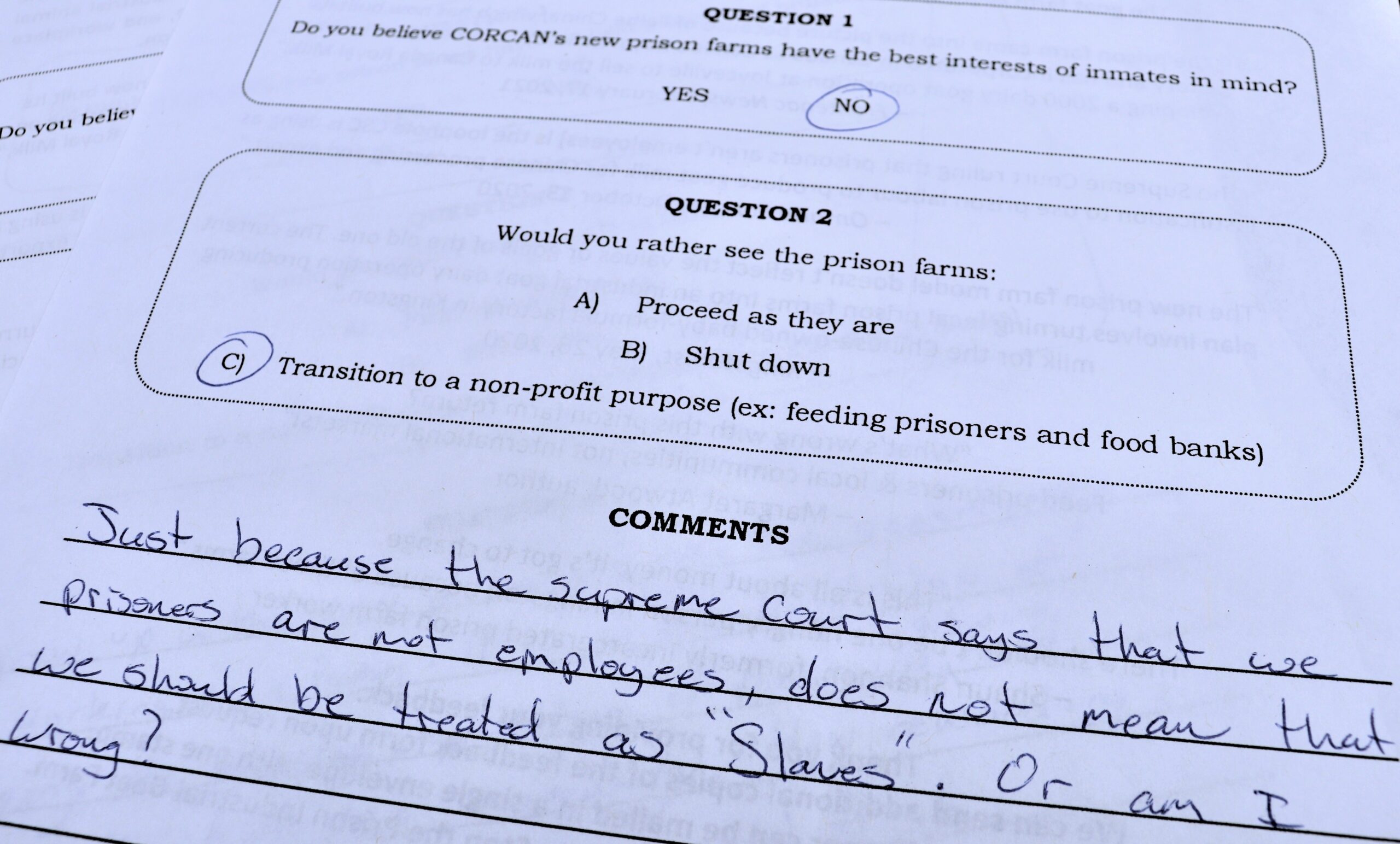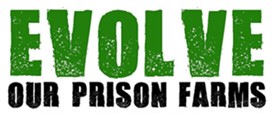PRISONER PERSPECTIVES
Feedback from incarcerated and formerly incarcerated persons.
“I personally could not be present in any area where animals are being killed. I have suffered a trauma so profound because of the offense I committed that just the thought of seeing any living thing die is unthinkable to me.”
Inmate, Joyceville Institution (Kingston, ON)
“It was a delight to read that your enterprise is looking for alternatives to the standard models of agriculture, while creating an allegory for justice.”
Inmate, William Head Institution (Victoria, BC)
“Enough is enough. No more to this madness of milking goats for China. No more to this grotesque movement away from rehabilitation. I cannot understand the persistent sponsorship of this program. The government perhaps seriously misjudged the collective opposition it would create.”
Inmate, William Head Institution (Victoria, BC)
PRISON FARM WORKER INTERVIEW
“They’ve had consultations with former inmates like myself but they never listened to us. I might as well just talk to a wall. They don’t listen. They’ve already got it in their mind what they want to do. They want to make it look like we’re consulting ex-offenders just to make them look good because they’re dead set on having this goat dairy operation come hell or high water. After all the consultations and the promises and statements made and all the back-slapping and the hand-shakes and the kissy-kissy mushy-mushy stuff… it’s going to be a shit show. Pardon my language but it’s going to be a huge shit show. That’s all it’s going to be.”
PRISONER SURVEY RESULTS
In 2018-2019, Evolve Our Prison Farms collected feedback from over 150 prisoners at federal penitentiaries across Canada. 75% voted for plant-based farms, 25% voted for dairy. This was before it was known that prison farms would produce milk for the Chinese market.
In 2020-2021, Evolve Our Prison Farms conducted a second survey of over 50 prisoners (distribution was limited due to COVID). 94% voted against the Correctional Service of Canada’s new prison farm model, and many offered comments.
“This proposed agribusiness is nothing more than further exploitation of prisoner labour by CORCAN and the industrial prison complex. Pay prisoners proper wages or shut CORCAN down. These new farms are inhumanitarian to the animals.”
“Resources should be devoted to helping the community. It would give inmates the ability to pay their debt to society.”
“This is just another example of the Government putting money over human life. Prisoners may not be employees BUT WE ARE NOT SLAVES!”
“The inmates who work on the farms would prefer that their free labour go to support the food banks across Canada and to feed themselves.”
“We need to do this to feed inmates and be given the opportunity to donate to the food bank so we can help the communities that we come from.”
“Exploitation direct des détenus.”
“We are inmates, not cheap labor.”
“Allez donc chier avec vos esti d’projet d’marde.”
“Our comments at La Macaza Institution Inmate committee is the same as Miss Margaret Atwood, author. Feed prisoners & local communities, not international markets! Us as inmate we do understand that an industrial Goat dairy operation would normally cause many inconvenience as for pollution and all. As for the cheap labour for that part there should be reward with bonus, it’s just the right thing to do. We do support farm in federal prison but they should put in place bonus and security health measure and also make sure that all the effort for this farming is for the local communities and to feed prisoners. NOT FOR INTERNATIONAL MARKETS.”
“Just because the supreme court says that we prisoners are not employees, does not mean that we should be treated as ‘Slaves.’ Or am I wrong?”
“I grew up in the city and would like the opportunity of working on a farm. It is an excellent way of helping the population of those in growing need within the Kingston community. How rewarding! Let’s help those at home (in Canada) first.”
“I work on the farm here at JI Min. While I have been able to acquire and sharpen employment skills, I can’t help but notice wasted opportunities to further enhance the rehabilitative value of this kind of results-driven hard work because of the looming CORCAN CSC oversights and rigid way of operating.”
“We have frames for greenhouses here that are NOT used. They should be used to grow food for here and needy in local community. Apple orchard is NOT harvested. A lot COULD be done for local community IF this place chose to.”
“CSC too slow in getting farm projects up & running. Current staff lack skills & initiative to be farm managers (nepotism). Focus on feeding prisoners & food banks. Goat project??? Not enough info. CSC keeps prisoners in the dark. Poor communication.”
“Under present pay system (no Corcan wages) I would not work for Corcan/CSC – slave wages. Also concerned about health issues as goats stink & air might be hazardous to my health. Too many questions re: health & safety. Typical CSC – Not well thought out/planned.”
“It’s an industrial operation with little benefit to anyone especially the inmate population.”
“I don’t believe that CORCAN Industries per se has the best interests of inmates in mind. It is nothing more than slave labor. Shutting down Corcan will also shut down federally sponsored slavery!!”
“I don’t think their new model has the best interests of inmates in mind. It should revert to its original model and help prisoners, instead of getting rich on inmate labour.”
“As they presently are – slave labor for one company or another – nothing to do with caring or rehabilitation. Simply want us to be used as work animals – with overhead threats – tow the line or be sent to higher security. Cheap forced labour.”
“Private businesses shouldn’t benefit from inmates labour. These kind of things will only lead to the privatizing of prison for profits; where inmates would be forced to work in unsuitable conditions instead of truly getting a chance to rehabilitate.”

RICKY ATKINSON
Excerpts from the memoir The Life Crimes and Hard Times of Ricky Atkinson (2017). As a young man, Atkinson worked at the former Frontenac (Collins Bay) Institution prison cow dairy farm and the former abattoir at Pittsburgh (Joyceville) Institution:
I had never been this close to a cow in my life. All of my assumptions about how soft and cuddly cows were went right out the window when I stepped up behind one, grabbed its shitty tail and got a hard kick in the shins.
I made my way down the line, hating every minute. They kicked me. They crushed me against the stall railings. They shit all over. If you weren’t quick to grab them, they slapped you in the face with their shitty tails.
It wasn’t easy to adjust to being around cows. I’d been on milking duty a couple of weeks when one of the cows stepped on my foot. I began to hit it with punches like a professional boxer. I don’t know why I did it but for some reason I needed to let off some steam. The next day, another cow crushed me against a railing and I rolled a series of punches on its side and on its head.
After a few days of this, the cows would moo and prance around nervously when I came into the barn, making it harder to milk them.
One day, a cow coughed when I was behind it. Green shit flew out of her ass and all over my face. I tore into that cow with my fists. Next thing I knew, the camp boss, Mr Kirby, was standing beside me.
“Atkinson, I knew something was up. Milk production is down. You hit a cow again, I’ll kick your ass.”
Later, Atkinson worked at the Joyceville abattoir:
My immediate job, however, was preparing cows for slaughter. It was my job to decide which seven cows would end up on death row on any given day. It was also my habit, while they waited to head down that ramp to their fate, to read the Bible aloud to them. ….Hearing a voice calmed them and helped me hone my speaking skills. I’d grown up a lot since the days when I was hitting the poor beasts with my fists.
THE SAGA CONTINUES
By Christian C., William Head Institution (Victoria, BC)
[Published in Out of Bounds Prison Magazine, Fall 2018]
Every inmate should care about being exploited, used as a vehicle to move deals forward from which we receive absolutely no benefit. Do you remember when the farms provided actual benefits like feeding inmates? What are the advantages in slaving away for some multinational when at the end of the day you cannot wash the stink of it out of your clothes; at least you get three bucks for your trouble.
Let us stop pretending and tiptoeing around what it really is. It is just another self-serving example of narrow-minded thinking used to provide opportunities to those with the deepest pockets.
What I would like to see is the collective of federal inmates clearly state that enough is enough. No more to this madness of milking goats for China. No more to this grotesque movement away from rehabilitation. No more selling every last reward to the highest bidder. We are expected to work, deal with the sickening side of processing, and clean up the mess without receiving a drop of milk for ourselves.
I cannot understand the persistent sponsorship of this program. The government perhaps seriously misjudged the collective opposition it would create.
It is a difficult journey working your way through prison life. Adding the burden of offensive and potentially harmful “rehabilitative practices” is tantamount to a kick in the nuts.
WHAT A FARCE!
By George Fraser, Bath Institution (Kingston, ON)
[Excerpts from “Employability Hurdles for Inmates Reintegrating on Release” published in Out of Bounds Prison Magazine, Winter 2021]
What a farce!
In the February 28, 2018 Federal Budget, $4.3M was committed to restore the prison farms at the Joyceville and Collins Bay institutions for the reason(s), “to provide federal inmates with training opportunities to acquire new skills while preparing for employment and successful reintegration and rehabilitation into the community.”
Really, this is laughable!
Especially when one considers that the local Member of Parliament in the Kingston area where the prison farms are located and the CSC ad hoc prison farm advisory group are touting the reactivation of CSC prison farms as a great step forward. What BS!
According to CBC News reports, “The aim is to get the farms up and running in late 2018 beginning with 33 cows; the barnyard would eventually expand to include some chickens, pigs and possibly a colony of bees.” Really, you just can’t make this stuff up!
Now put the prison farm $4.3M stimulation package in the 2018 Federal Budget into context with the March 22, 2017 Federal budget when the Finance Minister said, “current and meaningful 21st Century employment training is in crisis mode.”
The $4.3M 2018 Budget commitment to re-open shuttered prison farms “to provide federal inmates with training opportunities… in a barnyard” is without either justification or merit. Using a “farm” metaphor, this is “hogwash”!
Time for a reality check!
Corcan’s “dumb labour” employment training for rust belt shattered industry has no place in the 21st Century of artificial intelligence. The farm labour experience does not match the needs of employers on the outside for anything other than being farm labourers. The fact of the matter is that Millennials do not and will never aspire to pick apples or muck stables.
In Summary:
Correctional Service Canada’s failure to provide 21st Century employment and employability skills is cheating prisoners the opportunity to successfully reintegrate on release.
